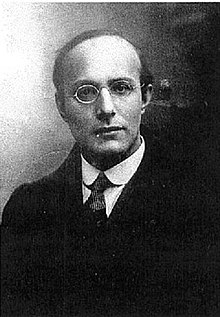Karl Polanyi
Karl Paul Polanyi (bahasa Hungaria: Polányi Károly [ˈpolaːɳi ˈkaːɾoj]; lahir 25 Oktober 1886, Wina, Kekaisaran Austria-Hungaria – 23 April 1964, Pickering, Ontario)[1] adalah sejarawan ekonomi, antropolog ekonomi, ekonom politik, sosiolog historis, dan filsuf sosial Hungaria-Amerika. Ia dikenal karena menentang pemikiran ekonomi tradisional dan buku karyanya, The Great Transformation. Polanyi saat ini dikenang sebagai pencetus substantivisme, sebuah pendekatan budaya terhadap ekonomi yang mempelajari cara ekonomi tertanam dalam masyarakat dan kebudayaan. Pandangan ini berlawanan dengan ekonomi arus utama, tetapi populer di bidang antropologi, sejarah ekonomi, sosiologi ekonomi, dan ilmu politik.
| Karl Polanyi | |
|---|---|
 | |
| Lahir | 25 Oktober 1886 |
| Meninggal | 23 April 1964 (umur 77) |
| Bidang | Sosiologi ekonomi, sejarah ekonomi, antropologi ekonomi |
| Mazhab | Mazhab ekonomi historis |
| Dipengaruhi | Robert Owen, Bronisław Malinowski, G. D. H. Cole, Richard Tawney, Richard Thurnwald, Karl Marx, Aristotle, Karl Bücher, Ferdinand Tönnies, Adam Smith, Alfred Radcliffe-Brown, Werner Sombart, Max Weber, György Lukács |
| Kontribusi | Ketertanaman, Substantivisme |
Pendekatan Polanyi terhadap ekonomi kuno telah diterapkan dalam sejumlah kasus seperti Amerika pra-Columbus dan Mesopotamia kuno, namun manfaatnya bagi studi masyarakat kuno masih dipertanyakan.[2] The Great Transformation Polanyi menjadi acuan bagi sosiologi historis. Teori-teorinya menjadi dasar gerakan demokrasi ekonomi. Putrinya, Kari Polanyi Levitt adalah dosen ekonomi emeritus di Universitas McGill, Montreal.
Karya
sunting- The Great Transformation (1944)
- Universal Capitalism or Regional Planning? di The London Quarterly of World Affairs, vol. 10 (3), (1945)
- Trade and Markets in the Early Empires (1957, disunting dan dilengkapi kontribusi penulis lain)
- Dahomey and the Slave Trade (1966)
- Primitive, Archaic, and Modern Economics: Essays of Karl Polanyi (1968, koleksi esai dan karya pilihan).
- The Livelihood of Man (Studies in social discontinuity) (Academic Pr; New Ed edition, November 1977)
Lihat pula
suntingCatatan kaki
sunting- ^ Encyclopædia Britannica (Chicago: Encyclopædia Britannica Inc. 2003) vol 9. p.554
- ^ For example, Morris Silver, "Redistribution and Markets in the Economy of Ancient Mesopotamia: Updating Polanyi", Antiguo Oriente 5 (2007): 89-112.
Referensi
sunting| Sumber pustaka mengenai Karl Polanyi |
| By Karl Polanyi |
|---|
- McRobbie, Kenneth, ed. (1994), Humanity, Society and Commitment: On Karl Polanyi, Black Rose Books Ltd., ISBN 1-895431-84-0
- McRobbie, Kenneth; Polanyi-Levitt, Kari, ed. (2000), Karl Polanyi in Vienna: The Contemporary Significance of The Great Transformation, Black Rose Books Ltd., ISBN 1-55164-142-9
- Mendell, Marguerite; Salée, Daniel (1991), The Legacy of Karl Polanyi: Market, State, and Society at the End of the Twentieth Century, St. Martins Press, ISBN 0-312-04783-5
- Polanyi-Levitt, Kari, ed. (1990), The Life and Work of Karl Polanyi: A Celebration, Black Rose Books Ltd., ISBN 0-921689-80-2
- Stanfield, J. Ron (1986), The Economic Thought of Karl Polanyi: Lives and Livelihood, Macmillan, ISBN 0-333-39629-4
- Dale, Gareth (2010), Karl Polanyi: The Limits of the Market, Polity, ISBN 978-0-7456-4072-3
Pranala luar
sunting- The Karl Polanyi Institute of Political Economy - The Karl Polanyi Institute of Political Economy at Concordia University web site.
- Karl Polanyi, The Great Transformation: The Political and Economic Origins of Our Time (1944) Review Essay by Anne Mayhew, College of Arts and Sciences, University of Tennessee
- Profile on Karl Polanyi Diarsipkan 2007-04-08 di Wayback Machine. - On the History of Economic Thought Website
- Kari Polanyi Levitt Diarsipkan 2008-12-08 di Wayback Machine.
- Karl Polanyi (video) from Marginal Revolution University
- The free market is an impossible utopia (2014-07-18), The Washington Post. A conversation with Fred Block and Margaret Somers on their book, The Power of Market Fundamentalism: Karl Polanyi’s Critique (Harvard University Press, 2014). The book argues that the ideas of Karl Polanyi are crucial to help understand economic recessions and their aftermath.